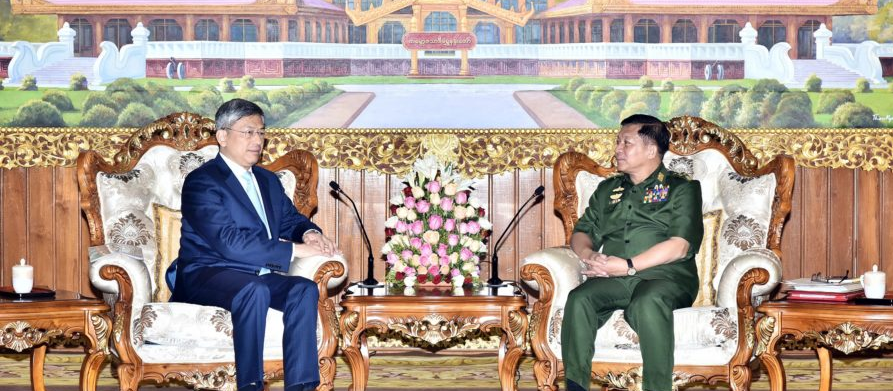Source: The Irrawaddy

Sen-Gen Min Aung Hlaing (right) meets with Chinese Ambassador Chen Hai in Naypyitaw on Thursday. / Office of the Commander-in-Chief’s website
YANGON—During a meeting with Myanmar military commander-in-chief Senior General Min Aung Hlaing in Napyitaw on Thursday, Chinese Ambassador Chen Hai reiterated that China stands with Myanmar when it comes to international pressure over the Rohingya crisis in Rakhine State, according to an army website.
The Office of the Commander-in-Chief released a brief statement about the discussions between Chen and Sen-Gen Min Aung Hlaing, saying the Chinese envoy highlighted three key points: Beijing doesn’t accept international pressure on Myanmar regarding the Rohingya and human rights; it seriously condemns the recent violent attacks in northern Shan State and Mandalay Region’s garrison town of Pyin Oo Lwin; and it “would continue to support Myanmar’s peace process and possible ways to improve peace dialogue” with ethnic rebel groups.
A series of coordinated offensives by an alliance of three ethnic armed groups—the Ta’ang National Liberation Army, the Arakan Army and the Myanmar National Democratic Alliance Army—in five locations in Pyin Oo Lwin and Naung Cho Township took the lives of 15 soldiers, police officers and civilians on Aug. 15.
On Aug. 19 the Chinese Foreign Affairs Ministry condemned the three rebel groups’ offensive and ongoing serious clashes between warring parties in northern Shan State. And on Thursday, Chen flew to Napyitaw to personally deliver Bejing’s diplomatic message to army chief Sen-Gen Min Aung Hlaing, who arrived back in Yangon from Moscow, where he attended the International Army Games on Monday.
Meanwhile, 3,500 Rohingya refugees were due to be repatriated to Maungdaw Township in western Myanmar’s Rakhine State from Bangladesh on Friday. If their return goes ahead as scheduled, it will be the first such repatriation under an official agreement worked out between the countries. More than 700,000 Rohingya fled to Bangladesh following the Myanmar military’s clearance operations against Rohingya militants in 2017.
However, the government’s plan could be delayed, as Human Rights Watch (HRW) and Amnesty International (AI) urged the government to suspend plans to repatriate Rohingya refugees until conditions on the Myanmar side allow for a “safe, voluntary and dignified” return. On Wednesday, the UN Security Council held a closed-door meeting on the plan in New York.
On the same day, four exiled Rohingya activist groups issued a joint announcement ahead of the Security Council meeting demanding the UN bring Myanmar Army chief Sen-Gen Min Aung Hlaing before the International Criminal Court (ICC) over his role in the brutal clearance operations against the Rohingya community in 2017, and that it impose targeted sanctions on the military as recommended in a recent report by the UN’s Fact-Finding Mission (FFM).
The joint statement reads, “International accountability and justice are essential precursors for the safe, voluntary and dignified return of our people to our homeland in Burma [as Myanmar was formally known]. Without this, our people cannot be asked to go back [to Myanmar] as recent reports suggest.”
The Rohingya Women Welfare Society (RWWS) is one of the organizations behind the joint statement. Its founder Raizya Ahed Mimi told The Irrawaddy that the Myanmar government must guarantee the rights and safety of the Rohingya, otherwise northern Rakhine’s Maungdaw region would also become a conflict zone. She said that if the government really wants development and peace in the region, recognition of the Rohingya as an ethnic group is crucial.
Raizya Ahed Mimi said, “I will go with the Rohingya if the Myanmar government guarantees security and rights.”
But her demand appeared unlikely to be met, based on an interview Myanmar Ambassador to the UN U Hau Do Suan gave to VOA Burmese on Wednesday. The ambassador, an ethnic Chin, said his government’s National Verification Card (NVC) is a type of verification form for every ethnic group across the country.
“Everyone has to abide by that (NVC),” U Hau Do Suan said.
Disclaimer: This article was originally produced and published by The Irrawaddy. View the original article at The Irrawaddy.














